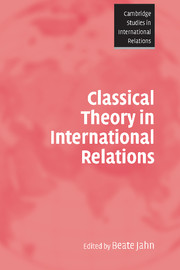Book contents
- Frontmatter
- Contents
- Notes on contributors
- Acknowledgements
- 1 Classical theory and international relations in context
- Part I Intellectual contexts
- Part II Political contexts
- Part III Lineages
- 9 The ‘other’ in classical political theory: re-contextualizing the cosmopolitan/communitarian debate
- 10 Images of Grotius
- 11 The Hobbesian theory of international relations: three traditions
- 12 Re-appropriating Clausewitz: the neglected dimensions of counter-strategic thought
- Index
- CAMBRIDGE STUDIES IN INTERNATIONAL RELATIONS
11 - The Hobbesian theory of international relations: three traditions
Published online by Cambridge University Press: 22 September 2009
- Frontmatter
- Contents
- Notes on contributors
- Acknowledgements
- 1 Classical theory and international relations in context
- Part I Intellectual contexts
- Part II Political contexts
- Part III Lineages
- 9 The ‘other’ in classical political theory: re-contextualizing the cosmopolitan/communitarian debate
- 10 Images of Grotius
- 11 The Hobbesian theory of international relations: three traditions
- 12 Re-appropriating Clausewitz: the neglected dimensions of counter-strategic thought
- Index
- CAMBRIDGE STUDIES IN INTERNATIONAL RELATIONS
Summary
Describing International Relations (IR) as a realm of ‘Hobbesian anarchy’ remains one of the most popular shorthand descriptions of the nature of world politics. To invoke Hobbes is to call forth the image of a world of conflict and perpetual danger, a ‘Realist’ vision of international politics as a ‘state of nature’ defined by continual insecurity, competition and potential or actual conflict. As is often the case with the use of classical political thinkers in IR, these references tend to be cursory, with declarations of world politics as a condition of ‘Hobbesian anarchy’ or a ‘Hobbesian state of war’ serving more as rhetorical or metaphorical markers than as full analytic accounts of either Hobbes' vision of international politics or its historical validity and contemporary relevance. This chapter has two goals. First, I provide a reading of Hobbes' vision of international relations that highlights its relationship to his political thinking as a whole, and especially to his concern with the relationship between knowledge and practice. I argue that Hobbes was concerned with what we would today perhaps call the social construction of politics, and that his work can be read as an attempt both to explicate the foundations of politics and an attempt to reconstruct politics in the light of them. Hobbes' vision of international politics can only be properly reconstructed and understood in the light of his concerns with the nature of political order as a whole and with the constitution of domestic political orders.
- Type
- Chapter
- Information
- Classical Theory in International Relations , pp. 253 - 276Publisher: Cambridge University PressPrint publication year: 2006
- 5
- Cited by

